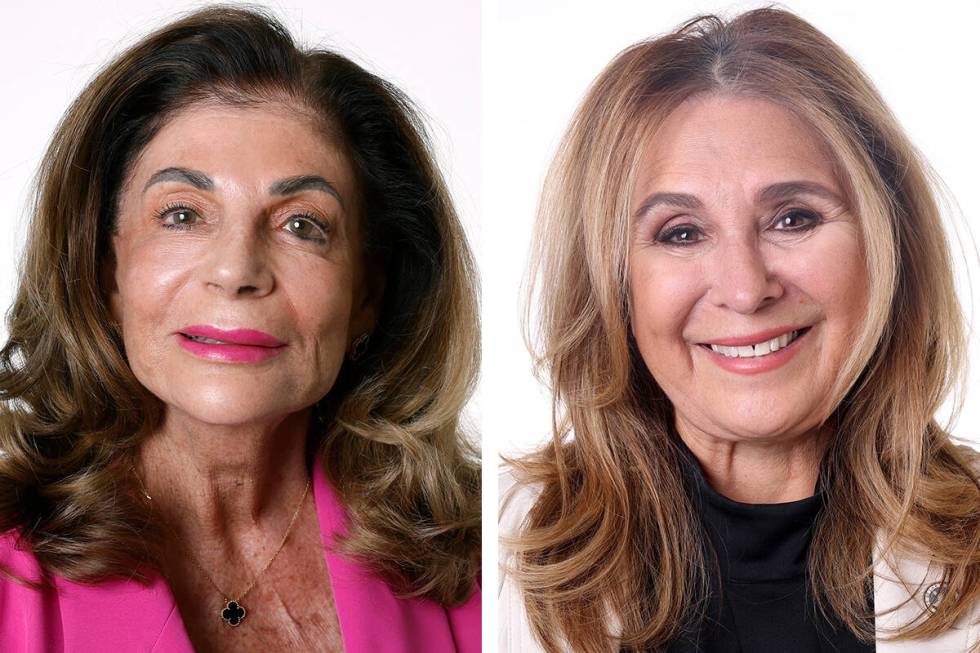Seaman, Berkley say getting voters in downballot mayor race is a challenge

Hundreds of millions of dollars poured into the U.S. federal races this election cycle ensures that voters know who’s at the top of the ticket and why they are choosing them. Beyond that top race on the ballot, however, things get murkier.
Call it the downballot blues.
It’s a particular problem for local nonpartisan candidates, who often lack the name familiarity and big campaign war chest to be heard amid the din of a presidential election. As a result, voters often leave those boxes on their ballot unfilled in phenomenon known by political scientists as ballot “roll off,” according to David Damore, UNLV political science professor and executive director of the Lincy Institute and Brookings Mountain West.
That roll off can be significant, according to the U.S. Vote Foundation, a data-driven civic engagement organization.
“In a typical presidential election year, when barely 50 percent of eligible voters cast a ballot, a third or more of those voting don’t bother to fill out the entire ballot,” according to the nonprofit. “While this will be by almost any measure a very atypical election, the question remains whether that same 30 percent of ballots will be about only one race and none other.”
Damore said that some cities hold mayoral elections in odd-numbered years when the ballots aren’t as crowded and voters can theoretically focus more on local issues. But the turnout is even lower.
“It’s damned if you do; damned if you don’t,” he said.
Mayoral candidates hoping to break through
Amid voter fatigue and partisan noise, Las Vegas mayoral candidates Councilwoman Victoria Seaman and former U.S. Rep. Shelley Berkley have campaigned for months to get their platform messaging across.
The nonpartisan mayor’s seat has been occupied by Oscar Goodman and Carolyn Goodman for a quarter century.
In previous races, Seaman has ran as a Republican and Berkley as a Democrat.
This time around, the candidates don’t have the benefit of having an “R” or a “D” next to their names on ballots that can attract the more partisan locals.
Tom Letizia, a veteran political consultant and Berkley’s campaign manager, noted that the mayor’s office deals with bipartisan issues, such as zoning and development.
“This is quite different from the dynamics in Congress or state legislatures, where partisan considerations are much more prominent,” Letizia wrote in an email.
While Seaman and Berkley raised hundreds of thousands of dollars, the candidates have also had to rely on heavy grassroots campaigning, walking neighborhoods, attending community events and shaking hands one potential voter at a time.
Seaman and Berkley spoke to the Las Vegas Review-Journal about their efforts.
Messaging ‘drowned out’
Seaman said that running as a partisan candidate might be easier because campaign messaging is “drowned out by the top-of-the-ticket races,” but that it wouldn’t be reflective of the position she’s seeking.
On a positive note, Seaman said, she’s not tied to “party bosses” or “hyper partisan” politics. She’s garnered support in an “organic” fashion, she said.
To break through, she’s relying on her five-year record as a city council member and community engagement, such as her work promoting local small businesses and meeting voters face to face, Seaman said.
“Even though we are very partisan right now,” she said about the electorate, “I think that people know that I’m going to do the job and I’m going to do it right,” she said.
Seaman added: “I believe the mayor’s race is going to affect their life the same, if not more, than the presidential (race) because local politics are truly local and it affects people’s everyday lives.”
Berkley said that out campaigning, she’s found a “very-high degree” of interest in the mayor’s race.
“If you need a pothole fixed, you don’t care that the mayor is a Republican or a Democrat,” said Berkley, adding that she “loves” the nonpartisan nature of the mayor’s seat.
Berkley said she’s benefited from name recognition from having served decades in public service, including stints in state and federal offices.
Still, “people want to meet you and see you and form their own opinion,” she said.
“I’ve been doing this a long time and I don’t think that this mayor’s race is particularly different than running for congress, the Board of Regents or the (Nevada) Assembly,” she said. “You have citizens that are very engaged and you have low-propensity voters that are just busy.”
In the final weeks, her campaign has put efforts in getting committed voters to follow through.
“I’m finding that I’m getting a lot of crossover voters … because it isn’t a partisan race,” she said.
Decided voters
The Review-Journal set out to interview Las Vegas voters one afternoon in late October to ask them for their choice for mayor. Many of them hadn’t even heard about the race or its candidates.
Roger Baldwin, who had just cast his ballot at Las Vegas City Hall, said he heard about Seaman through advertisement and found out she was a registered Republican.
Baldwin was concerned about homelessness issues and budget concerns, and said he was content with the city’s operations.
“I like more of the conservative values,” he said.
L’Tonya Andrews said she’d received mailers from both campaigns but hadn’t heard much more from either candidate because she’d been busy.
But a Berkley commercial convinced her to support the former congresswoman. She was most worried about rising rents.
“I hope that she does what she says she’s going to do,” Andrews said.
Contact Ricardo Torres-Cortez at rtorres@reviewjournal.com.